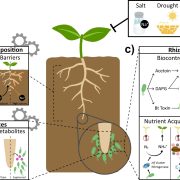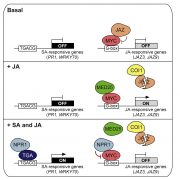Silicate enhances rhizobacteria network complexity in sugarcane rhizosphere
Silicon (Si) plays a significant role in helping plants to mitigate biotic and abiotic stress. Previous studies have shown that the application of S i also influences the microbial communities in the rhizosphere. However, the extent to which Si shapes the dynamics of plant growth promoting rhizobacteria (PGPR) in the rhizosphere is less explored. Here, Leite et al. investigated the influence of silicon on the PGPR community in the sugarcane rhizosphere. They assessed the PGPR community within the rhizosphere of three sugarcane genotypes in the presence (Si+) and absence (Si-) of Si in the form of silicate. Specifically, the authors used 16S rRNA sequencing to evaluate the richness, diversity, composition, co-occurrence network, and niche occupancy of the PGPR community. Although the results showed no significant influence of the treatments and the genotypes on the richness and diversity of the PGPR, they found varied effects of the Si treatment across the three genotypes. Two of the three genotypes showed increased network complexity in the presence of Si, indicating that the effect of the Si treatment may be genotype dependent. The authors concluded that Si application increases the complexity of microbial networks with the potential to increase plant growth. These findings highlight the possibility of increasing PGPR interaction networks as a recipe for sustainable agriculture. (Summary by Abdulkabir Omeiza Abdulmalik @Omeiza_PlantDoc) Rhizosphere 10.1016/j.rhisph.2024.100855
i also influences the microbial communities in the rhizosphere. However, the extent to which Si shapes the dynamics of plant growth promoting rhizobacteria (PGPR) in the rhizosphere is less explored. Here, Leite et al. investigated the influence of silicon on the PGPR community in the sugarcane rhizosphere. They assessed the PGPR community within the rhizosphere of three sugarcane genotypes in the presence (Si+) and absence (Si-) of Si in the form of silicate. Specifically, the authors used 16S rRNA sequencing to evaluate the richness, diversity, composition, co-occurrence network, and niche occupancy of the PGPR community. Although the results showed no significant influence of the treatments and the genotypes on the richness and diversity of the PGPR, they found varied effects of the Si treatment across the three genotypes. Two of the three genotypes showed increased network complexity in the presence of Si, indicating that the effect of the Si treatment may be genotype dependent. The authors concluded that Si application increases the complexity of microbial networks with the potential to increase plant growth. These findings highlight the possibility of increasing PGPR interaction networks as a recipe for sustainable agriculture. (Summary by Abdulkabir Omeiza Abdulmalik @Omeiza_PlantDoc) Rhizosphere 10.1016/j.rhisph.2024.100855









